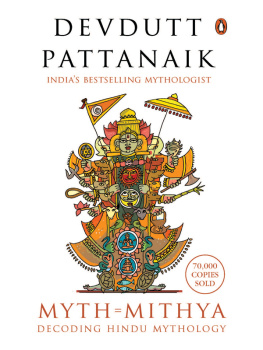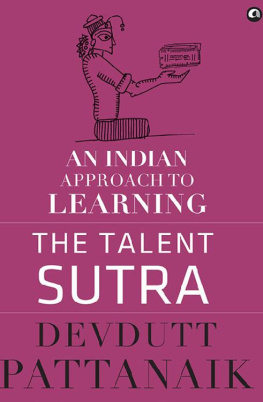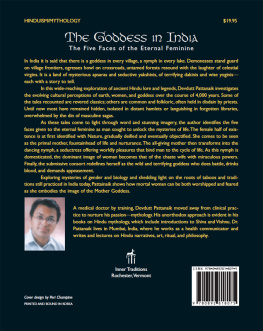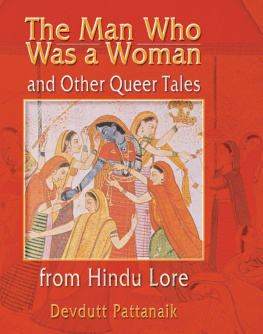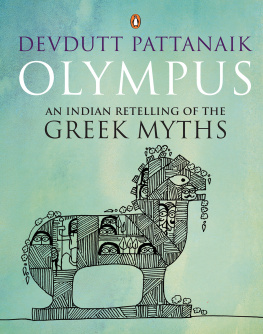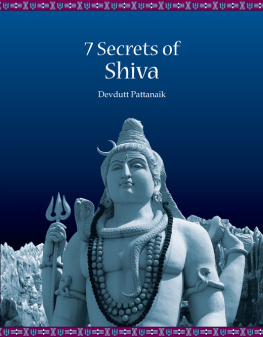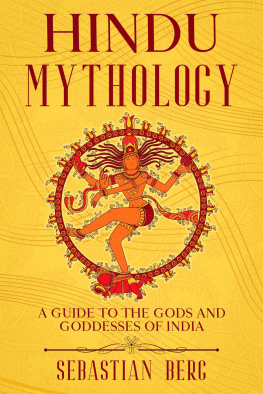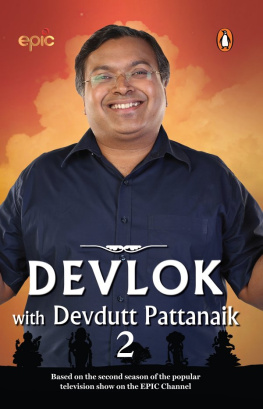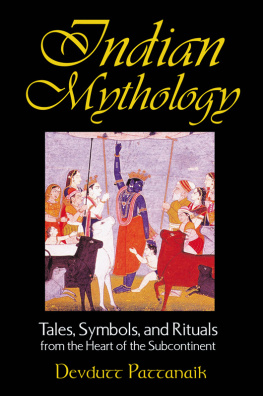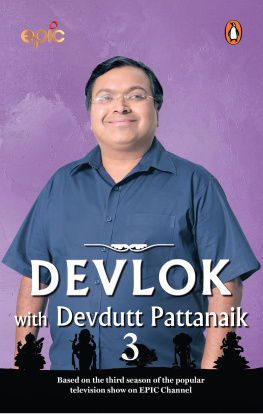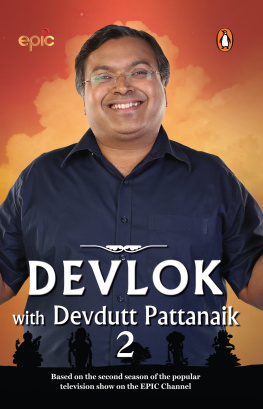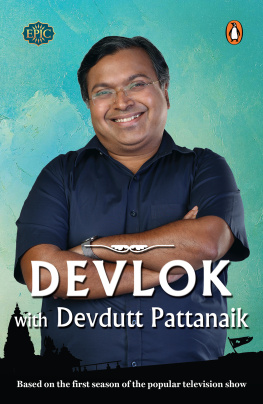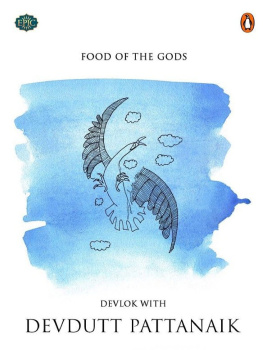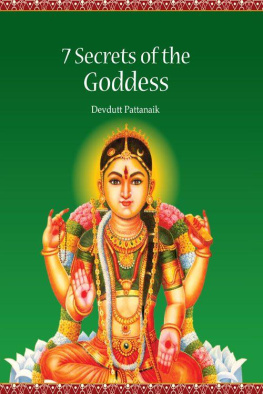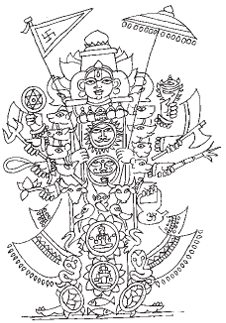PENGUIN BOOKS
Published by the Penguin Group
Penguin Books India Pvt. Ltd, 7th Floor, Infinity Tower C, DLF Cyber City, Gurgaon-122002, Haryana, India
Penguin Group (USA) Inc., 375 Hudson Street, New York, New York 10014, USA
Penguin Group (Canada), 90 Eglinton Avenue East, Suite 700, Toronto, Ontario, M4P 2Y3, Canada
Penguin Books Ltd, 80 Strand, London WC2R 0RL, England
Penguin Ireland, 25 St Stephens Green, Dublin 2, Ireland (a division of Penguin Books Ltd)
Penguin Group (Australia), 707 Collins Street, Melbourne, Victoria 3008, Australia
Penguin Group (NZ), 67 Apollo Drive, Rosedale, Auckland 0632, New Zealand
Penguin Books (South Africa) (Pty) Ltd, Block D, Rosebank Office Park, 181 Jan Smuts Avenue, Parktown North, Johannesburg 2193, South Africa
Penguin Books Ltd, Registered Offices: 80 Strand, London WC2R 0RL, England
First published by Penguin Books India 2006
www.penguinbooksindia.com
Text and illustrations copyright Devdutt Pattanaik 2006
All rights reserved
ISBN 978-01-4342-332-4
This Digital Edition published in 2014.
e-ISBN: 978-81-8475-021-8
This e-book is sold subject to the condition that it shall not, by way of trade or otherwise, be lent, resold, hired out, or otherwise circulated without the publishers prior written consent in any form of binding or cover other than that in which it is published and without a similar condition including this condition being imposed on the subsequent purchaser and without limiting the rights under copyright reserved above, no part of this publication may be reproduced, stored in or introduced into a retrieval system, or transmitted in any form or by any means (electronic, mechanical, photocopying, recording or otherwise), without the prior written permission of both the copyright owner and the above-mentioned publisher of this e-book.
For sale in the Indian Subcontinent and Singapore only
PENGUIN BOOKS
MYTH=MITHYA
Devdutt Pattanaik is a medical doctor by education, a leadership consultant by profession and a mythologist by passion. He has written and lectured extensively on the nature of sacred stories, symbols and rituals and their relevance in modern times. His books with Penguin India include The Book of Ram, Myth = Mithya: A Handbook of Hindu Mythology, The Pregnant King, Jaya: An Illustrated Retelling of the Mahabharata, Sita: An Illustrated Retelling of the Ramayana, and the Devlok series of stories for children.Devdutts unconventional approach and engaging style are evident in his lectures, books and articles. To know more visit www.devdutt.com.
Myth = Mithy a
Decoding Hindu Mythology
DR DEVDUTT PATTANAIK
Illustrations by the Author
To all the Gods, Goddesses, gods, goddesses ,
demons and angels there ar e
Author's Note
- The stories in this book are my own retellings, often simplified with a great deal of poetic licence, to accommodatewithout losing the essencedetails from various versions of the same story found in different scriptures
- No italics have been used to distinguish between English and non-English words
- Capital letters have been restricted to names and titles except where explicitly stated
- Gods and Goddessesspelt with an initial capital letter need to be distinguished from gods and goddesses in lowercase. The former are manifestations of the infinite divine while the latter are finite forms of the divine. Shiva is God but Indra is god. Durga is Goddess but Ganga is goddess.
- Sanskrit words are sometimes used as proper nouns and begin with a capital letter (for example, Maya, the Goddess who embodies delusion) and sometimes as common nouns spelt without capitals (for example, maya, delusion)
- This handbook is a decoding of Hindu mythology, firm in the belief that:
Within infinite myths lies the eternal truth,
Who sees it all?
Varuna has but a thousand eyes
Indra a hundred
And I, only two.
How to Read This Book :
Author s Recommendatio n
You dont have to go through this book sequentially. While that helps, you can also choose to dip into the book at random and read the captions under the illustrations and the tables and flowcharts. If you do decide to read it sequentially, do so at a leisurely pace. Take time to absorb and enjoy the ideas before you move on.
Introduction: Myth=Mithya
In which the meaning of myth, its value
and expression are elaborated
Everybody lives in myth. This idea disturbs most people. For conventionally myth means falsehood. Nobody likes to live in falsehood. Everybody believes they live in truth.
But there are many types of truth. Some objective, some subjective. Some logical, some intuitive. Some cultural, some universal. Some are based on evidence; others depend on faith. Myth is truth which is subjective, intuitive, cultural and grounded in faith.
Ancient Greek philosophers knew myth as mythos. They distinguished mythos from logos. From mythos came intuitive narrations, from logos reasonable deliberations. Mythos gave rise to the oracles and the arts. From logos came science and mathematics. Logos explained how the sun rises and how babies are born. It took man to the moon. But it never explained why. Why does the sun rise? Why is a baby born? Why does man exist on earth? For answers one had to turn to mythos. Mythos gave purpose, meaning and validation to existence.
Ancient Hindu seers knew myth as mithya. They distinguished mithya from sat. Mithya was truth seen through a frame of reference. Sat was truth independent of any frame of reference. Mithya gave a limited, distorted view of reality; sat a limitless, correct view of things. Mithya was delusion, open to correction. Sat was truth, absolute and perfect in every way. Being boundless and perfect, however, sat could not be reduced to a symbol or confined to a word. Words and symbols are essentially incomplete and flawed. Sat therefore eluded communication. For communication one needs symbols and words, howsoever incomplete and flawed they may be. Through hundreds of thousands of incomplete and flawed symbols and words, it was possible to capture, or at least to indicate, the infinite perfection and boundlessness of sat. For Rishis therefore the delusion of mithya served as an essential window to the truth of sat.
Myth is essentially a cultural construct, a common understanding of the world that binds individuals and communities together. This understanding may be religious or secular. Ideas such as rebirth, heaven and hell, angels and demons, fate and freewill, sin, Satan and salvation are religious myths. Ideas such as sovereignty, nation state, human rights, womens rights, animal rights and gay rights are secular myths. Religious or secular, all myths make profound sense to one group of people. Not to everyone. They cannot be rationalized beyond a point. In the final analysis, you either accept them or you dont.

If myth is an idea, mythology is the vehicle of that idea. Mythology constitutes stories, symbols and rituals that make a myth tangible. Stories, symbols and rituals are essentially languageslanguages that are heard, seen and performed. Together they construct the truths of a culture. The story of the Resurrection, the symbol of the crucifix and the ritual of baptism establish the idea that is Christianity. The story of independence, the symbol of the national flag and the ritual of the national anthem reinforce the idea of a nation state.

